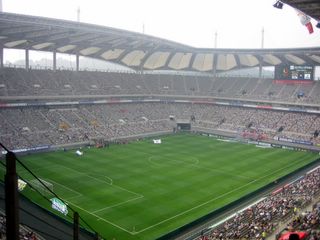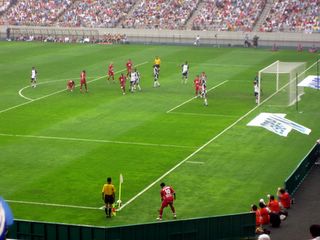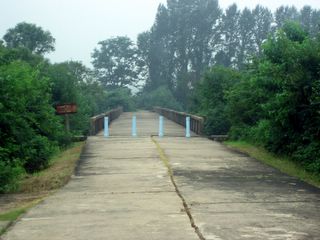I'm Out!
Today is my last day of work, and my second-to-last in Korea. Tomorrow will be spent packing up, showing the POTGOS around Seoul a little more, and making general arrangements for departure. Shortly after lunch on Sunday, I depart for Tokyo. So I guess it's time to wrap this baby up.
I know when I get back to the U.S. I'm going to be besieged with questions along the lines of "How was Korea?" Obviously, there is no simple answer. I don't even really know where to begin trying to sum this up. I will say that I got exactly what I wanted out of this summer. I wanted to go somewhere totally different, somewhere that I'd never been and would in all liklihood never go to again (at least for a long time). I wanted to experience what it's like to find myself in a completely foreign culture and have to figure my way through it. I wanted both the challenge and the excitement of doing that, and my two months in Korea have more than provided it.
In hindsight, I'm extremely glad that I wound up coming here. Unlike a lot of other countries to which I sent resumes, I didn't really have much of an impression of Korea before I came here--it was very much a last-minute decision, something that I never really contemplated until the end of January. Because I hadn't formed a whole slew of preconceived expectations, I think I was really able to see Korea with a fresh set of eyes that made the experience more exciting and more enjoyable.
A few other thoughts, and then I'll wrap up:
--As I said above, I wanted not just the exhilaration but also the challenge of travellin to someplace completely different. Boy did I get it. I hadn't realized just how great the language barrier would be, and just how isolating that could make it from time to time. After a while, the novelty of struggling through an elaborate pantomime or looking up words in a phrasebook just to order a meal or buy mouthwash wears off, and you start to really miss the familiar. I definitely felt that, even though I had friends here and worked at a firm where everyone spoke at least some English and most people spoke quite well or fluently. It gave me tremendous respect for those immigrants who pick themselves up and just flat-out move to another country and build a whole new life. This felt sort of like summer camp to me, in the sense that there was always an end date set. But what a challenge to try and make a new life out of it.
--I gained, I think, a greater appreciation for the nuances of the North Korea/South Korea situation. It's far more complex than we see in the States, and certainly more complex than the Bush administration portrays. It's instructive that everyone here--liberals and conservatives--thinks that Bush is screwing this whole thing up because he simply doesn't understand it. Maybe the Bush administration will take that to heart. Yeah, right.
--While the "touristy" things that I did (visiting Gyongbokung palace, the DMZ, the beach at Busan and the beautifully bizzare baseball game) were memorable and lots of fun, the thing that was great about this summer was that by spending a full two months here, and because I got to meet people through the firm and through other friends, I was able to get additional points of entry into Korean culture that I wouldn't have gotten otherwise, and this in turn meant I was able to break out of the "typical" tourist life. I've eaten mostly at restaurants that don't cater to westerners, and I've gotten to experience aspects of Korean life--visits to norebang, booking, room salons, my trip to Ganghwa island--that tourists can't really access. This was perhaps the most exciting and interesting part of my time here.
So that's my take. I would have thought that I'd understand Korea better after two months here than when I first arrived, but in some ways the opposite is true. Each time I thought I'd dug a little bit into Korean culture, for the step forward I took I discovered far greater layers of complexity lying beneath the surface. I suppose I have a greater knowledge of Korean culture than I did in May, but that little bit of knowledge also makes me aware of just how little I know.
One last thing--several people have asked if I'm going to continue the blog either for my trip to Japan and China or when I return to the States. My friend Norm Ham even suggested a satirical GFOS back in Boston (with entries like "I went to Dunkin' Donuts again today. Apparently Bostonians can't pronounce the letter "R" and are legally required to wear one item of Citysports clothing each day). Not gonna happen. This blog was a good method for sharing my experiences and misadventures, but once I leave here I first become just another tourist and then just a schmuck law student who occupied with the contents of his navel. You don't want to read about it any more than you want to see your aunt and uncle's vacation videos, and I'm not going to pretend you do. So it ends here.
Thanks for reading this summer and following along. If you commented from time-to-time, thanks for adding you two cents. As Chris Russo would put it, that's a nice job by you guys there. Good work outta the readers. I hope you enjoyed reading it as much as I enjoyed writing.
The Godfather has left the building.




































